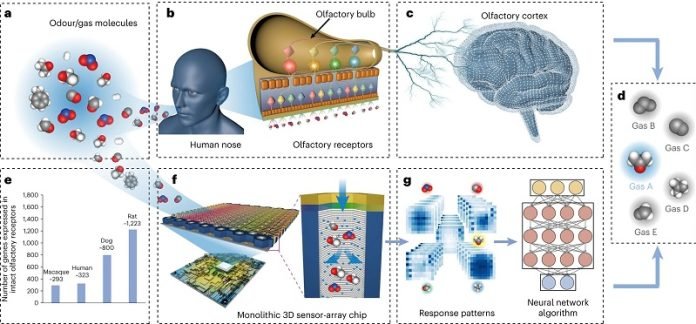
Imagine a tiny chip that can sniff out smells and gases just like our noses do.
A group of smart scientists at the Hong Kong University of Science and Technology (HKUST) has made this idea a reality.
They’ve created special chips that work almost like a super-powered nose, able to detect a huge variety of odors and gases.
For a long time, people have been trying to make machines that can smell – kind of like creating an electronic nose.
The goal is to copy how humans and animals can tell apart all sorts of different smells. But making something so small and smart has been really tough.
The big challenge was to make these smell-detectors tiny enough and sharp enough to pick out specific smells from a mix of many.
The lead scientist, Professor Fan Zhiyong, and his team came up with a brilliant solution. They designed these tiny chips with loads of mini sensors on them – up to 10,000 on each chip!
These sensors are on a special kind of surface that makes them even better at catching and recognizing different smells.
By using some clever material tricks and the help of artificial intelligence, these chips can now tell apart a wide range of gases and even figure out complex smells from 24 different odors.
It’s a bit like having a nose that can smell thousands of things all at once!
But they didn’t stop there. The team took one of these chips and attached it to a robot dog, along with cameras for eyes.
This gave the robot a sense of smell and sight, allowing it to find objects it couldn’t see just by sniffing them out.
This breakthrough is not just cool science; it can do a lot of helpful things. For example, it can be used in factories to keep an eye on safety by detecting dangerous gases or in the food industry to make sure things are fresh.
It can even help in search and rescue missions by sniffing out signs of people in places where humans or dogs can’t reach.
Professor Fan, who has been working on making robots more like humans and animals by giving them senses like sight and now smell, hopes these chips could one day be used to help us detect smells we can’t naturally smell.
This could warn us about diseases early on by noticing changes in the smell of our breath or skin.
This work, shared in the journal Nature Electronics, is a big step toward making technology that can “smell” part of our everyday lives, much like cameras are today.
Professor Fan’s dream is that these smell-sensing chips could one day make our world safer and healthier, and even more interesting, by giving us a whole new way to detect and understand the smells around us.


